Abu Dhabi Louvre / Abu Dhabi
French connection
Now that the celebratory bunting has been taken down and the much-hyped Louvre Abu Dhabi is finally open for business, what does the future hold? Is it an oasis of culture in a desert of extremism, a building that embodies global understanding or a theme park of airbrushed internationalism put together by a French state keeping its eyes on the prize?
The big deal to build the Louvre Abu Dhabi was signed in 2007, the same year that Monocle sent its first issues to press. And although we wouldn’t describe the building of our respective brands in the subsequent decade as fellow-feeling exactly, there is a symmetry: much was expected; there has been a journey; and a lot of water has passed under the Sheikh Khalifa Bridge. We remember being invited to the ground-breaking reception amid the echoing marble of the Emirates Palace Hotel; we were kept updated on all things deemed shiny, bright and beautiful on Saadiyat Island, Abu Dhabi’s cultural quarter that also promises a Guggenheim Museum designed by Frank Gehry and the Zayed National Museum designed by Norman Foster (with a recently dissolved agreement for the British Museum to lend exhibition assistance). And then – zoom! – 10 years fly by and we’re walking over the threshold of what was once just a vision: Jean Nouvel’s Musée du Louvre amid the hastily arranged palm trees on the shoreline of an island pulled from the sea. It feels very new but not very now, somehow: something like the echo of a promise from more idealistic – or maybe more hubristic – days of yore. Was it worth the wait? Who’s it for? What does it say about France’s idea of itself? And about Abu Dhabi? Maybe after spending more than €1.5bn on a museum it should simply be the best in the world or perhaps we expect too much in the way of global problem-solving from a mere building and its contents?
Well maybe we shouldn’t feel bad about expecting too much when we read stuff like this: “My friends, here starts the fight of the generation, for our youth. This fight we are fighting with a spirit of conquest because from our side we represent the beauty of the world.” These words, worthy of a blousy – if aesthetically minded – Henry V before Agincourt, were part of President Macron’s speech at the opening of the new Louvre. It was spoken as he stood amid a phalanx of unelected Middle Eastern leaders, each (you feel) restraining themselves from too obviously checking their watches or signalling to their drivers to bring the Maybach round, pronto. Macron’s words are fighting talk for peace; boosterism for the prowess of French soft power; they want to say, “Heal the world/ Make it a better place/For you and for me and the entire human race.” But they can’t because Michael Jackson got there first.
In fact, the unlikely seed from which the Louvre Abu Dhabi grew was the terrorist attacks of 11 September, 2001. President Jacques Chirac felt that culture could be a soothing voice, especially if it spoke with the placid intonation of a curator who’s great with kids and puts classical sculpture, pre-Colombian artefacts and, sure, 18th-century French paintings in the same room and makes it look like they’re talking to each other about liberté, égalité et fraternité. You know, things that places like the UAE, Qatar, Bahrain and Oman are all about in a big way.
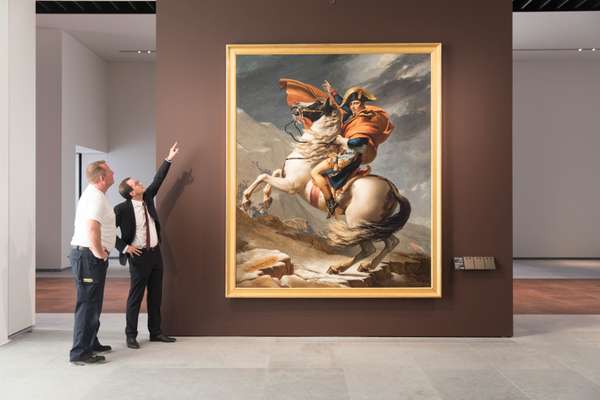
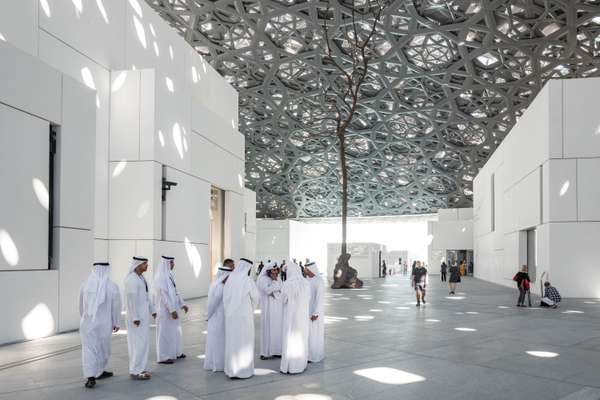
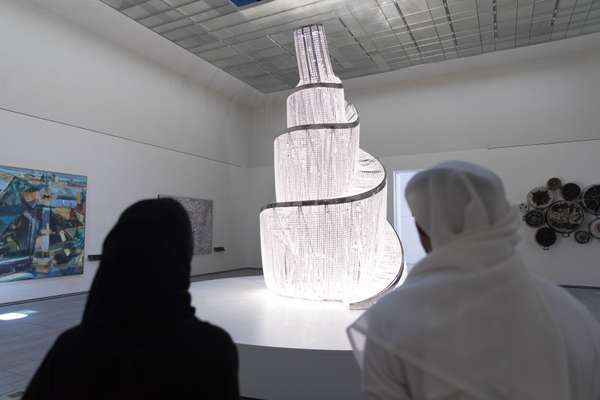
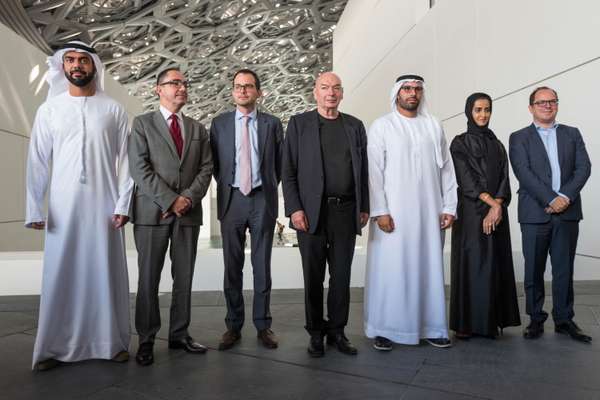
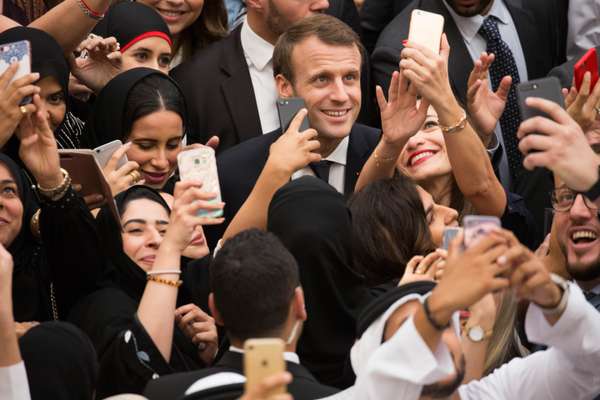
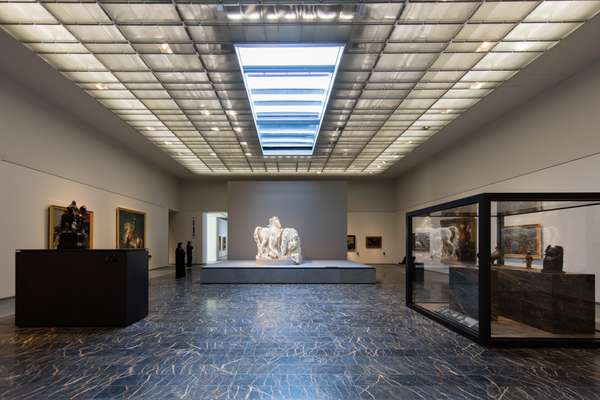
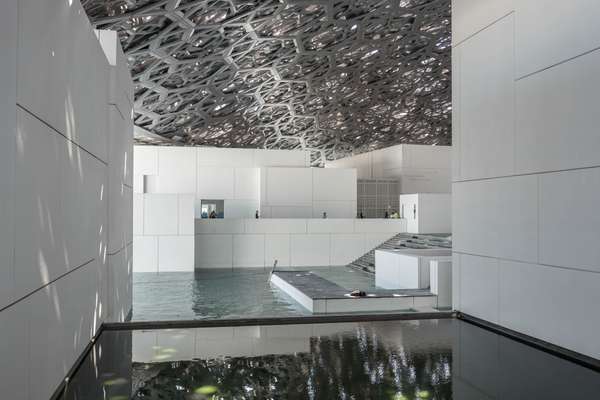
Jacques Chirac was also a president who loved a grand projet. Paris’s ethnographic museum, the Musée du Quai Branly, was his attempt at levelling the cultural playing field a little in favour of non-European civilisation (by saying, “These voodoo dolls are great, aren’t they?”). So the Louvre Abu Dhabi was dreamt up, with good intentions no doubt. But it also gave France a wonderful opportunity to flex some serious cultural muscle in a country with little of its own.
What is this relationship like? To say it’s akin to a European aristocrat saved from drowning in death duties by marrying a cheerful but crafty American heiress would be naughty. To say there is a certain convenience to the marriage but that it’s not precisely a marriage of convenience is probably OK. Jacques Chirac saw this museum as a sword of culture to slay the dragon of Islamic extremism and it’s amazing just how much those swords cost these days. As projets go, €445m to lease the name “Louvre” for 30 years (the countdown started on signature of the deal, so there are 20 left), €635m for staff and logistics and a reputed €510m in building costs, is close to the definition of grand.
Other swords mentioned in the process of founding, funding and building the projects on Saadiyat Island have been less metaphorical. Nations that do arms deals with the uae are required to invest in a fund that, it has been claimed, may somehow be linked to the funding of the Louvre Abu Dhabi and other large-scale projects. The idea that French arms deals might have helped fund a new Louvre makes the peace candle gutter a little, doesn’t it? On a clear day you can see the French naval base that was built over the water from the museum in Port Zayed in 2009. Curatorially speaking, this adjacency might not be quite the witty juxtaposition that it seems.
But come on: French soft power’s been doing so well recently. There’s Macron himself: young and still half sane. And then there’s the fact that France isn’t the UK (staggering around with a gunshot wound in its foot, wondering what happened) or the US (busy talking to itself really loudly in a faraway corner). On the international stage, France has spent decades looking like a cartoon skeleton, obscured by cobwebs, worms dying of boredom before they can even slither out of her eye sockets. But not any more. Now France looks relatively cool, competent and cheerful about the future for the first time since the 1960s.
For Abu Dhabi, this museum is a coup. It was expensive but so what? Working conditions came under fire but now the Louvre’s been built, people will focus their criticism on the exhibitions (and the aircon and the parking). Not right, maybe, but likely. The future will be interesting: loans will be wound down after a decade and handover of management and curatorial control will be worth watching, as French gives way to Arabic in these 55 buildings forming a modernist medina under Jean Nouvel’s cool, latticed dome by the sea.
Of course it’s freezing in here, the perfect ice-storm of Emirati aircon and art-preserver’s deep-freeze. The attendants are all wearing fleeces. And then there are treasures by the tonne from Greece and Egypt to Flanders and Florence by way of Gabon and Guinea. “We Live By The Same Light”, say the posters all across town. In the end it’s admirable, this Louvre. But we feel like we’re in Perpignan, not Paris. You didn’t really think the French would give you that, do you?


